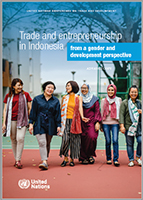
With a population of 275.8 million as of 2022, Indonesia is the fourth most populous country in the world after China, India, and the United States. It is also the world’s 16th largest economy and a member of the Group of 20 (G20). Indonesia has made important progress towards increasing gender equality, especially in the areas of educational enrolment and access to healthcare services. However, gender gaps persist in other areas.
This study, which focuses on trade and gender linkages and their impact on women’s entrepreneurship in Indonesia, forms part of UNCTAD’s teaching material on trade and gender.
The aim of this capacity-building initiative is to promote the capacity of policymakers, civil society organizations, academics, and other stakeholders to examine the interaction between trade and gender, and develop gender-responsive policies.
The report is structured as follows:
- Section 2 gives an overview of socioeconomic and gender profiles.
- Section 3 presents the trade structure of Indonesia.
- Section 4 examines the impact of Indonesia’s trade flows and trade policy on women’s economic empowerment and entrepreneurship, with a focus on selected case studies from each broad economic sector, namely the oil palm sector from agriculture, the wearing apparel and furniture sectors from industry, and the tourism, wellness, creative economy, and banking sectors from services.
These sectors are either major exporters or key sectors of the domestic economy in which women are concentrated, and they are all priority sectors for the government.
Section 4 also discusses women entrepreneurs in e-commerce as an emerging area of interest for trade and female entrepreneurship.
- Section 5 delves into trade policy. It analyses the gender and trade nexus in Indonesia, international good practices, and country examples of economies similar to Indonesia. On that basis, the section proposes a roadmap to use trade and related policies to support women’s economic empowerment and entrepreneurship.
- Section 6 summarizes the main findings of the report and presents a policy implementation framework.
This study is the result of a collaboration between the UNCTAD and the Asian Development Bank (ADB), under the project “Promoting transformative gender equality agenda in Asia and the Pacific: Advancing gender-responsive trade policy in the Republic of Indonesia”.




